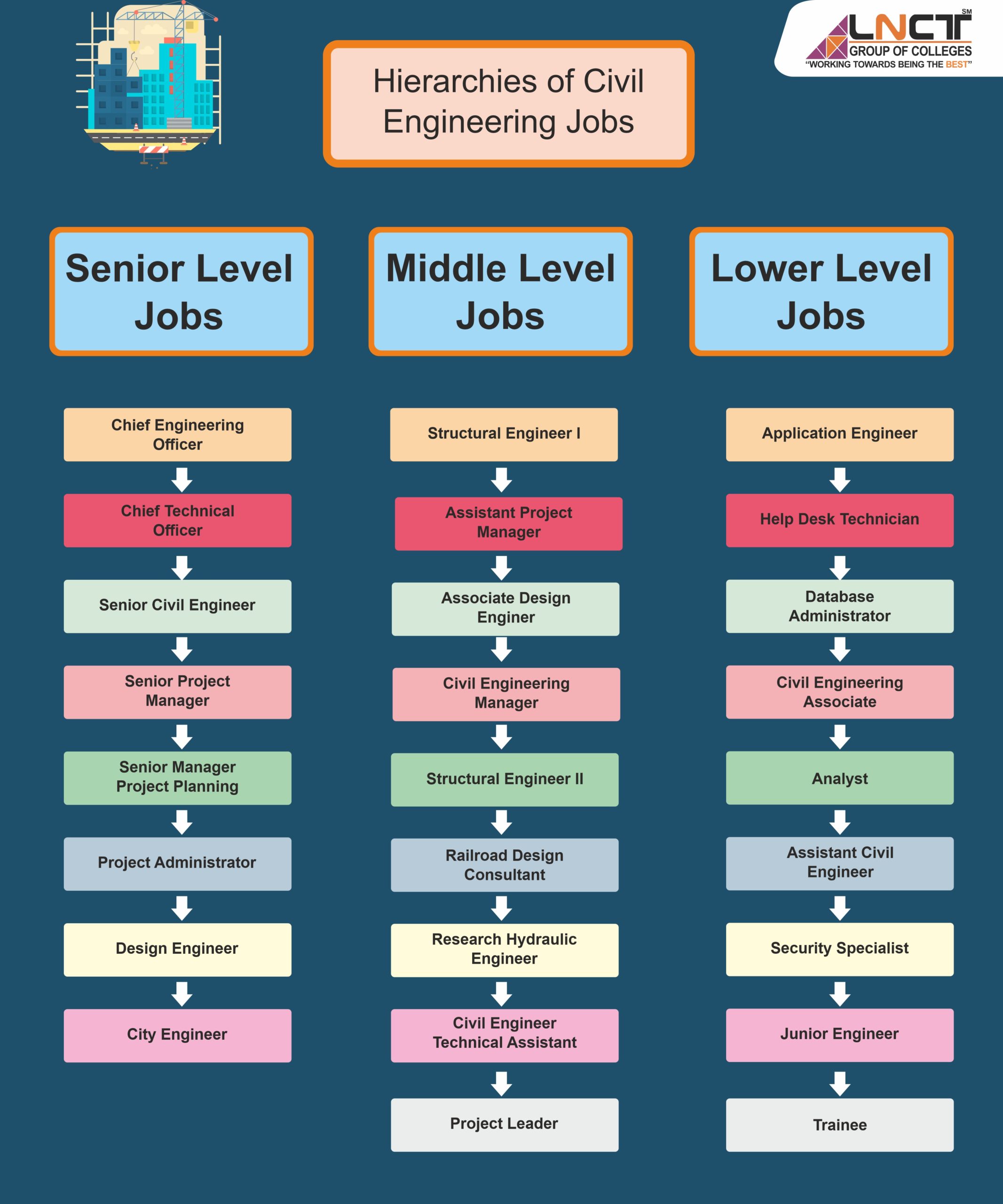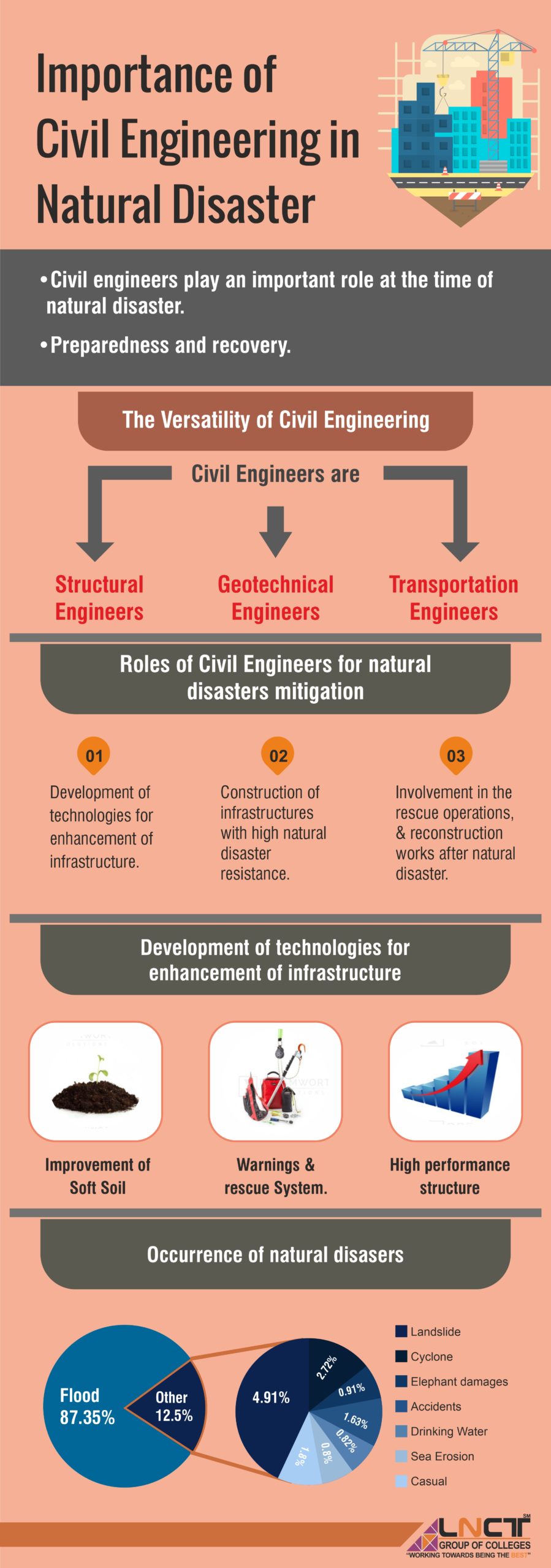Best College for Civil Engineering in India.
With the advancement of science and technology, the field of civil engineering is set to revolutionize in the coming decades. In a recent survey, the Ricsroyal Institute of Chartered Survey predicted a demand and supply gap of 44 million in civil engineering professionals, in India in the year 2020.
In Civil Engineering there lies a huge demand & supply gap, though it is one of the core branches that attract many students to pursue engineering. Civil Engineering requires active involvement from students and encourages them to develop solutions to problems with innovation and creativity.
Other such surveys have highlighted massive gaps between the demand and supply of civil engineers, encouraging students to opt for civil engineering and become experienced professionals in the very promising field.
Such staggering numbers suggest that the field of civil engineering holds massive scope for aspiring students. Civil engineers, actively contribute to the development of the world. Their expertise is in heavy demand in both the public and private sectors.
The field of Civil engineering has massively evolved from the previous times. The discipline steadily grew, and civil engineers were responsible for designing, building, and maintaining the world’s built into their natural environment.
The current paper aims to trace the importance of civil engineering in the current times and the scope of prospects, it will hold in the coming decades. It further goes on to explore the different segments of the branch of civil engineering and attempts to answer the whys of the field.
It sheds light on the course description, different degrees, and diplomas of civil engineering, and also attempts to trace the jobs awaiting civil engineers, both in the public and private sector and the companies hiring them.
Civil engineers, therefore, in many ways are the backbone of contemporary society, who uses their awareness, knowledge, and expertise, to create a sustainable world.
They are trained to use technology exceptionally to create a better world. All major construction projects are headed by trained civil engineers, who look into the matter and create marvelous structures. Civil Engineers, therefore, are important for the development of the world.
 Scope of Civil Engineering?
Scope of Civil Engineering?
Civil Engineering is one of the oldest disciplines of engineering, that deals with the study of planning, constructing, designing, supervising, and maintaining infrastructures, which is a major part of modern contemporary life, such as buildings, bridges, highways, schools, hospitals, auditoriums and more.
The course trains the individuals to protect the environment and public health, with the sole aim of improving infrastructure.
Many institutes have recognized the importance of civil engineering and offer students, specialized courses that will cater to their respective needs and help them in enhancing their skills and abilities.
Various diplomas, under graduation, and post-graduation degrees are offered to the students. The field of civil engineering offers a lot of specializations for students to choose from.
Aspirants, based on their interest can opt for a course. The field of civil engineering is likely to grow shortly, as predicted by the Global Market Insight, which in a recent report published an expected growth of up to 11.72 trillion USD in the next five years, by 2025.
Why should you opt-in civil engineering degree?
As mentioned above, the scope of civil engineering is expected to grow drastically in the coming years, which will eventually lead to more jobs in the sector, making it one of the most promising and rapidly growing fields.
Students must understand the massive amount of scope the field has to offer and must be encouraged to pursue the same. The following are some reasons why should you choose civil engineering:
Versatile Sector– Civil engineering is one of the most versatile sectors. It deals with a wide variety of fields, and therefore gives the students or aspirants to grow steadily.
A civil engineer is likely to get projects, from many sectors such as Geotechnical, Energy and Power, Environmental, and more, giving them an understanding of sustainable construction in a wide range of fields, making Civil Engineering one of the most versatile sectors.
Excellent Job Prospectus– Civil Engineers are readily employed in both the public and private sectors. Both the sectors offer an opportunity to grow steadily in the field.
Many students in India, prepare themselves, for Government Jobs in Civil Engineering, they must be encouraged to do so. Experts in the field can go on to open consultancy firms and create other self-employment opportunities for themselves.
Creativity and Innovation– Apart from excellent job opportunities and versatility in the field, civil engineers have the ability to use their creativity and add innovative designs to technical solutions, which can then be easily administered and find application in the real world.
Civil Engineers are motivated to find better and new solutions than previously used traditional ones. They actively work for better design structures using their creativity and innovation.
Ability to make a difference– As the world is continuously evolving and new technologies are being developed, civil engineers have an opportunity and ability to make a difference in the life of the people, both at the individual and community level.
Civil Engineers protect the lives of people by constructing strong and sustainable buildings, and they have the primary task of repairing the damaged structures and protect them from further damage, in this manner they have the ability to make a difference in the lives of the people.
Excellent Pay packages– Civil Engineers are readily employed by major industries in both the public and private sector, with an excellent pay package, which is likely to grow, with the growth of experience and expertise.
In this manner, they have the opportunity to fulfill their dreams and live with an increased standard of living. Excellent pay packages are one of the primary reasons, why students must be encouraged to pursue civil engineering.
Students must recognize the importance of this versatile field, the employment opportunities, excellent pay package, and the steady growth that the field offers, that the field has to offer, and must be encouraged to pursue it.
The excellent scope that the field has to offer is unmatched by any other branch of engineering. Civil Engineering, by far, is one of the most versatile fields of engineering, with an active application of individual creativity and innovation, and therefore students must be encouraged to pursue it.
Courses offered in Civil Engineering: Sub-disciplines, Description, and Duration
Civil Engineering is a very wide field of study. It offers many sub-disciplines too, for the students to choose from.
LNCT offers courses, at undergraduate and postgraduate levels to aspiring students. The sub-disciplines for specializations offered by the field are discussed below,
Students can opt to specialize in any of the above-mentioned fields, based on their aptitude and interest.
Such a large number of specializations make the field of civil engineering versatile in nature, and thus provide great opportunities for aspirants to excel in a varied number of fields.
Civil Engineers are essentially needed in any type of construction project, be it Land Engineering or Hydraulic Engineering, these sub-fields and these specializations highlight the importance of civil engineers in the coming times.
What are the courses offered by LNCT in civil engineering and what are their eligibility criteria?
Placement Records of LNCT
| Level | Program | Time Duration | Name of the course | Eligibility criteria. |
| UG | B. Tech | 8 semesters | B. Tech – Civil Engineering | Candidates who have passed their 10+ 2 from the PCM stream from any recognized board, and through the All India test Exam. |
| PG | M. Tech | 4 semesters | M. Tech – Structural Engineering,
Construction Management |
Candidates who want to pursue their post-graduation must possess B.E or B.Tech degree in the concerned subject. |
| Diploma | Diploma- Engineering | 6 semesters | Diploma- Civil | Candidates who wish to pursue their diplomas in the field must have cleared 10th with Science subject with a minimum of 50 % marks for general category or 45% marks for ST, SC, or OBC. |
The Curriculum
Colleges all over India, have a different curriculum that needs to be followed in completing their degree in Civil Engineering, but the preliminaries and the fundamentals of the program, remain unchanged.
Many universities and institutes opt for a credit system, where students have to complete a required number of credits to gain a degree. The 8-semester B.Tech program of Civil Engineering is likely to cover the following topics, in their syllabus.
| Semester I | Semester 2 |
| Chemistry | Physics |
| Basic Electronics | Mathematics – II |
| Mathematics- 1 | Engineering drawing and graphics. |
| Mechanics | Basic Electronics. |
| Electrical Technology | Electrical Technology |
| Engineering Drawing and graphics | Programming and Data Structures. |
| Introduction to the manufacturing process | Introduction to the manufacturing process. |
| English for communication. |
| Semester 3 | Semester 4 |
| Hydraulics | Water Resource engineering |
| Solid Mechanics | Structural Analysis |
| Water and wastewater engineering | Transportation Engineering |
| Mathematics III | Surveying I |
| Breadth I | Surveying II |
| Semester 5 | Semester 6 |
| Soil Mechanics & Foundation Engineering | Elective II |
| Design of RC Structures | Elective III |
| Breadth (IT) | Elective IV |
| Breadth II | Elective V |
| Elective I | Design for Steel Structures |
| Project I |
| Semester 7 | Semester 8 |
| IT & CAD Applications | Breadth |
| Elective | Breadth III |
| Elective VI | Project III |
| Industrial Training | Viva Voce |
| Project II |
The curriculum may vary from institute to institute, but the basics remain the same. Apart from B.Tech (undergraduate), post-graduate courses in the name of M.Tech have also offered, that cater to the needs of the students, and teach them the importance of the field, and makes them experts in the same.
The diplomas offered, also aim to impart students with the application of the subjects. Students must take care of the eligibility criteria before choosing to pursue a specific course and only then carry it forward.
What are the essential skills required to be a civil engineer?
Engineers, at the most basic, are innovative problem solvers. They are trained to develop and work around problems in a new and innovative manner, which is sustainable and effective in nature.
Civil Engineers to are problem solvers, and they effectively work in their respective fields, to make this world a better place. Some of the most important skills required to be a civil engineer are:
Analytical and Critical thinking– Civil engineers must have an analytical and critical mind that will help them in assessing the complex problems of the field. A natural ability to solve highly complicated and complex problems is, therefore, one of the most essential prerequisites in becoming a civil engineer.
Creativity and Innovation– The role of civil engineers is to find a real-life application of their technical models of engineering. Therefore, creativity and innovation are two important skills needed to be a civil engineer. They must find creative and innovative solutions to the real-life problems of life, and work their way around them.
Technical skills- Every engineer must possess strong technical skills, with an active understanding of the principles of science, mathematics, and computer science.
Technical skills are needed to identify the existing problems and to devise a solution for them. An excellent understanding of design techniques, blueprints, drawings, and maps is required, to analyze, identify, and interpret the problem as well as the solution. Civil engineers therefore must possess excellent technical skills.
Managerial and organizational skills– The ability to manage and organize the whole project and a large number of people, is one of the most essential prerequisites to be a civil engineer.
Civil engineers are responsible for time management, acquiring resources, and managing a large number of people, therefore, civil engineers must possess exceptional managerial and organizational skills.
Communication skills– Civil engineers, must possess the ability to communicate effectively with both parties, and therefore must possess excellent communication skills.
They work with a diverse range of people, from different backgrounds and ethnicities, and therefore, must possess great innovation skills to navigate through the problems with ease.
Problem-solving ability– In the midst of the project, many unforeseen problems may emerge, and therefore to navigate through them, civil engineers must have exceptional problem-solving ability. This ability helps them to find quick and innovative solutions to their problems.
Project management– Civil Engineers must possess excellent project management skills. Civil Engineers are often responsible for overseeing that the project assigned is timely managed and finished. This means that civil engineers who head the project must possess the ability to manage projects and guide subordinates effectively, without any hassle.
Leadership and teamwork– Civil Engineers are expected to lead projects and therefore, they must possess essential leadership qualities and must be not biased in their approach. As a lot of people are involved to complete a project, civil engineers must possess the ability to work efficiently with a team. Teamwork and leadership are, therefore, two very crucial skills that are needed to be a civil engineer.
Apart from the above-mentioned abilities, civil engineers must have a passion for learning and must possess a keen eye with attention to detail. This ability helps them to work efficiently in their field and helps them to prosper.
People, who possess the above-mentioned skills, are likely to grow and prosper in their jobs without any difficulties. Their technical abilities and innovative approach help them essentially to find real-life applications and problem solvers, with the approaches of engineering.
What are the Job Prospects in the field of Civil Engineering?
Construction Management and Civil Engineering Education Source
Civil engineers will find ample amounts of job opportunities in both the private and public sectors. The numerous government jobs can be backed by students when they clear the respective entrance exam.
Civil engineers find government jobs in many sectors such as the Military, Armed forces, and various Public Sector Undertakings (PSUs). Each sector conducts a different set of examinations and students must qualify them to secure a safe job.
Apart from this, many private companies offer employment to capable individuals, and graduates are even encouraged to find self-employment opportunities or form consultancy firms.
Graduates in civil engineering, secure a great number of positions and have a multitude of job opportunities. Some of the most common jobs for civil engineers are mentioned in the table below.
| Profile | Description | Average salary |
| Site Engineers. | One of the most prominent jobs of civil engineer graduates is site engineers. Site Engineers are responsible for managing the whole project. They organize and supervise the overall work and the timely completion of the project. They are a crucial part of the site management team. | Depending on the concerned firm, the salary of site engineers varies, but on average, they earn up to 3-4 lacs per anum, which is likely to increase with the increase of experience. |
| Structural Engineer. | Structural Engineers are responsible for designing, planning, and supervising the entire construction of infrastructural projects. They are responsible for the alteration and extension of already existing properties. | Structural engineers earn up to around 4.5-5 lacs in a year, which is likely to grow with the gaining of experience and expertise. |
| Construction Engineer | The primary role of the Construction Engineer is to plan and supervise the ongoing construction. They basically act as middlemen between the firm and the people working on the construction site. They ensure the smooth running of the project. | The expected average salary of a Construction Engineer is around 2-3 lacs per annum, which varies from firm to firm, and grows up with experience. |
| Geotechnical Engineers | Geotechnical Engineers supervise projects and work for innovative solutions around problems concerning geology. They work together with the team and work within to find innovative solutions and ideas. | Geotechnical Engineers are valued members of the team, and they earn a respected salary of 3-4 lacs per annum on an average, which is expected to grow with the growth inexperience. |
| Lecturer/ Professor | Experts in the field of civil engineering, with a knack for teaching, can opt to be a lecturer or a professor, to teach the subject, to new students, and familiarize them with the nuances of the field. It is one of the most respectable professions. | Depending on the institute and the designation, salaries of professors vary widely, all across India, however, it can be fairly assumed that they earn up to an average of 4-5 lacs annually which is expected to grow with experience. |
Private firms
Everyone wants to be their own boss, because of which many students opt for the possibility of self-employment establishing their own firms or consultancy services. These companies then go on to take projects on the behalf of the government and engage in building dams, bridges, roads, and more.
The rapid advancement of technology in the current times is one of the biggest advantages in the field. These advancements lead to better employment opportunities for innovative individuals, who have the ability to apply real-life models of engineering in the real world.
Private firms are therefore one of the best options for civil engineering graduates. These private firms employ a large number of professionals, with a great margin of profit. Construction and sustainable infrastructure are a mark of development. Some of the major private firms employing civil engineers are:
TATA Consulting Engineers Ltd.
Punj Lloyd
Newton Engineering & Chemicals Ltd.
Jacobs Engineering
L & T
Power Grid Corporation of India Ltd.
Apart from this, setting up private consultancy firms is also one of the most viable options for civil engineering graduates. People with exceptional technical and organizational skills have the ability to run the firms smoothly.
Government Jobs after Civil Engineers
The government sector offers a multitude of job opportunities for civil engineers. An aspirant can join the Public Sector Undertakings (PSUs), on clearing the GATE exam with high scores.
Students on their part must be sincere in their studies and must effectively work to clear the GATE examination with a high score. Every year, various PSUs hire new graduates based on their GATE scores.
Students, therefore, must possess essential skills, both technical and managerial, to secure a position. Some of the PSUs, best suited for civil engineers are:
- Indian Oil Corporation Ltd.
- Airports Authority India
- National Highway Authority of India
- Hindustan Petroleum Corporation Ltd.
- Nuclear Power Corporation of India Ltd.
- Oil and Natural gas Corporation Ltd.
- Power Grid Corporation of India Ltd.
- Tehri Hydro Development Corporation India Ltd.
- National Fertilizers Ltd.
- NLC India Ltd.
Working in a PSU is a well-reputed job, with experts in the field earn up to 7-10 lacs annually. Apart from excellent salaries, government jobs offer other multitudes of benefits as well, such as complete job security, health benefits, pension after retirement, and so on.
Therefore, students must work hard, to secure a position in a PSU. In a PSU, individuals get the opportunity to work for the betterment of the public and change the lives of many people. The perks and the benefits of working in the government sector are unmatched and students, therefore, must be encouraged to pursue the field.
Why should you choose LNCT?
With the scope of civil engineering so large and wide, students must, therefore, be wise in choosing their institute and their field of study.
LNCT offers the best of education and has a record for excellent placement opportunities. With world- class facilities, great infrastructure, well-equipped laboratories, enriched libraries, and a student-friendly campus, all contribute greatly to the overall holistic development of the students.
Apart from these, some other characteristic features of the institute that makes it one of the best are-
- Virtual Classroom and hi-tech, well-equipped labs.
- Project-based learning and Certificate courses.
- MOOC learning.
- A Great number of electives to choose from.
- Efficient Research and Development team
- International Transfer program
- Start-up incubation cell.
- Steady development in career.
- Excellent Placement opportunities
- Great exposure
- Regular site visits
- Expert lecture regularly
All these factors, greatly contribute to making LNCT one of the best institutes to pursue the field of civil engineering. Students must recognize the excellent potential the field holds and its scope in the near future, and therefore must take an informed decision about choosing their field of study and specialization.
The experienced faculty members of the institute aim to impart quality education to both the set of students those who wish to secure a job and those who wish to pursue their higher studies.
The institute provides great exposure to the students and the students on their part must also actively work in inculcating necessary skills, both technical and organizational that will help them to prosper in the field.
Conclusion; Future in Civil Engineering
It can be fairly concluded that the field of civil engineering holds massive scope in the near future, with exceptional career opportunities in the coming years, as the recent studies and surveys have predicted.
Therefore, students must be encouraged to pursue this very promising field of civil engineering, which has the excellent potential both in the private and public sectors.
A great number of jobs await skilled individuals in the government sector after completing their studies in the field. LNCT provides quality education along with excellent exposure and amazing job opportunities for the students, making it one of the best institutes.
In the private sector too, they have the opportunity to work as Project Managers, Construction Head and so much more, depending on their field of specialization. Establishing a private consultancy firm is also one of the most promising career prospects in the current times.
Civil engineers, readily employ their expertise, in order to create sustainable constructions and buildings, without harming the environment. Infrastructure and construction are among the primary indices, used by people and organizations to measure the status of development of a society or the nation at large, civil engineers, therefore, play a major role in determining and working towards the development of the country.
The bridges, dams, industrial or residential complexes that they work on are important in determining the status of development, therefore, civil engineers, are essentially needed for the betterment of the society and the nation at large.
Civil engineers play an important role in our lives. In modern times, we need roads, buildings, dams, factories, homes and so many more essentials to live a happy life. Civil engineers, make this happen with the help of their expertise and the latest technology.
Civil engineers are a huge asset to the nation. A civil engineer with optimal skills such as innovation, creativity, technical skills, critical thinking and more can easily find a job, in both the private and government sector and their expertise can then contribute to the growth and development of that particular firm or organization.
Students must recognize this and do their own research, to select a specialization that will cater to their interests and aptitude.
The field of civil engineering is very versatile, and offers many sub-disciplines, and therefore, better opportunities for jobs and growth in the future. The field also gives individuals the power to bring change at a community level, and therefore contribute greatly to the development of the nation.
It is the skill and expertise of these individuals that will help in the development of the nation. Civil engineers, therefore, are well respected.
The field of civil engineering offers immense growth for individuals, with their innovative and creative solutions to modern problems, and their exceptional ability to bring the technical field of engineering and devise solutions using the same in the real world.
There is no doubt, that the field of civil engineering offers a wide scope, with growth both at the personal and professional level. Students must, therefore, recognize these credits and benefits and must be encouraged in order to pursue this field, from the best of institutes that aims for the overall holistic development of the students.




 Scope of Civil Engineering?
Scope of Civil Engineering?

